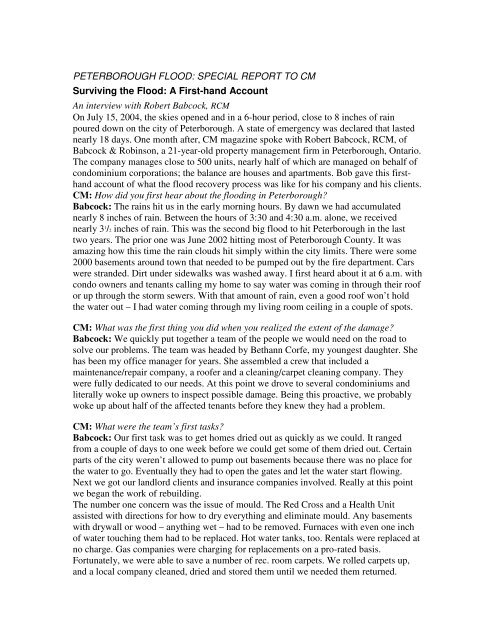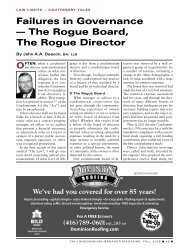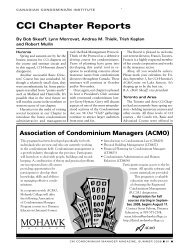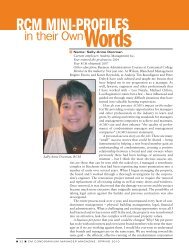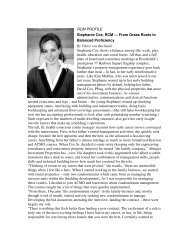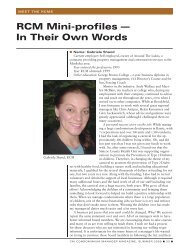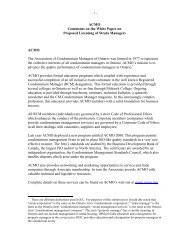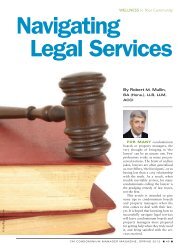Surviving the Flood: A First-hand Account - Association of ...
Surviving the Flood: A First-hand Account - Association of ...
Surviving the Flood: A First-hand Account - Association of ...
You also want an ePaper? Increase the reach of your titles
YUMPU automatically turns print PDFs into web optimized ePapers that Google loves.
PETERBOROUGH FLOOD: SPECIAL REPORT TO CM<br />
<strong>Surviving</strong> <strong>the</strong> <strong>Flood</strong>: A <strong>First</strong>-<strong>hand</strong> <strong>Account</strong><br />
An interview with Robert Babcock, RCM<br />
On July 15, 2004, <strong>the</strong> skies opened and in a 6-hour period, close to 8 inches <strong>of</strong> rain<br />
poured down on <strong>the</strong> city <strong>of</strong> Peterborough. A state <strong>of</strong> emergency was declared that lasted<br />
nearly 18 days. One month after, CM magazine spoke with Robert Babcock, RCM, <strong>of</strong><br />
Babcock & Robinson, a 21-year-old property management firm in Peterborough, Ontario.<br />
The company manages close to 500 units, nearly half <strong>of</strong> which are managed on behalf <strong>of</strong><br />
condominium corporations; <strong>the</strong> balance are houses and apartments. Bob gave this first<strong>hand</strong><br />
account <strong>of</strong> what <strong>the</strong> flood recovery process was like for his company and his clients.<br />
CM: How did you first hear about <strong>the</strong> flooding in Peterborough?<br />
Babcock: The rains hit us in <strong>the</strong> early morning hours. By dawn we had accumulated<br />
nearly 8 inches <strong>of</strong> rain. Between <strong>the</strong> hours <strong>of</strong> 3:30 and 4:30 a.m. alone, we received<br />
nearly 3 1 /2 inches <strong>of</strong> rain. This was <strong>the</strong> second big flood to hit Peterborough in <strong>the</strong> last<br />
two years. The prior one was June 2002 hitting most <strong>of</strong> Peterborough County. It was<br />
amazing how this time <strong>the</strong> rain clouds hit simply within <strong>the</strong> city limits. There were some<br />
2000 basements around town that needed to be pumped out by <strong>the</strong> fire department. Cars<br />
were stranded. Dirt under sidewalks was washed away. I first heard about it at 6 a.m. with<br />
condo owners and tenants calling my home to say water was coming in through <strong>the</strong>ir ro<strong>of</strong><br />
or up through <strong>the</strong> storm sewers. With that amount <strong>of</strong> rain, even a good ro<strong>of</strong> won’t hold<br />
<strong>the</strong> water out – I had water coming through my living room ceiling in a couple <strong>of</strong> spots.<br />
CM: What was <strong>the</strong> first thing you did when you realized <strong>the</strong> extent <strong>of</strong> <strong>the</strong> damage?<br />
Babcock: We quickly put toge<strong>the</strong>r a team <strong>of</strong> <strong>the</strong> people we would need on <strong>the</strong> road to<br />
solve our problems. The team was headed by Bethann Corfe, my youngest daughter. She<br />
has been my <strong>of</strong>fice manager for years. She assembled a crew that included a<br />
maintenance/repair company, a ro<strong>of</strong>er and a cleaning/carpet cleaning company. They<br />
were fully dedicated to our needs. At this point we drove to several condominiums and<br />
literally woke up owners to inspect possible damage. Being this proactive, we probably<br />
woke up about half <strong>of</strong> <strong>the</strong> affected tenants before <strong>the</strong>y knew <strong>the</strong>y had a problem.<br />
CM: What were <strong>the</strong> team’s first tasks?<br />
Babcock: Our first task was to get homes dried out as quickly as we could. It ranged<br />
from a couple <strong>of</strong> days to one week before we could get some <strong>of</strong> <strong>the</strong>m dried out. Certain<br />
parts <strong>of</strong> <strong>the</strong> city weren’t allowed to pump out basements because <strong>the</strong>re was no place for<br />
<strong>the</strong> water to go. Eventually <strong>the</strong>y had to open <strong>the</strong> gates and let <strong>the</strong> water start flowing.<br />
Next we got our landlord clients and insurance companies involved. Really at this point<br />
we began <strong>the</strong> work <strong>of</strong> rebuilding.<br />
The number one concern was <strong>the</strong> issue <strong>of</strong> mould. The Red Cross and a Health Unit<br />
assisted with directions for how to dry everything and eliminate mould. Any basements<br />
with drywall or wood – anything wet – had to be removed. Furnaces with even one inch<br />
<strong>of</strong> water touching <strong>the</strong>m had to be replaced. Hot water tanks, too. Rentals were replaced at<br />
no charge. Gas companies were charging for replacements on a pro-rated basis.<br />
Fortunately, we were able to save a number <strong>of</strong> rec. room carpets. We rolled carpets up,<br />
and a local company cleaned, dried and stored <strong>the</strong>m until we needed <strong>the</strong>m returned.
Underpadding needed replacing, <strong>the</strong> basement needed to be dried and any exposed areas<br />
treated to prevent mould. We even used a power washer when needed. I’ve heard <strong>of</strong> a<br />
number <strong>of</strong> places that were not cleaned and dried properly and now <strong>the</strong> mould is<br />
everywhere. We had to do all this with minimal disruption to our clients.<br />
CM: Was <strong>the</strong> storm anticipated?<br />
Babcock: There were storm warnings on <strong>the</strong> day but not more than usual. No one had<br />
any idea it would be this bad. I suffer from migraines and what used to bring <strong>the</strong>m on was<br />
a low pressure system. I had a doozey <strong>of</strong> a migraine for a couple <strong>of</strong> days earlier and<br />
should have known.<br />
CM: Do you have an emergency plan in place for such an event?<br />
Babcock: We don’t have a written plan in place simply because you don’t know what<br />
you’re going to face and when. Two years earlier we had experienced a flood and five<br />
years ago we had winter ice damming that affected about one third <strong>of</strong> Peterborough’s<br />
condominiums with conditions that caused ro<strong>of</strong>s to leak. From this experience we knew<br />
how to deal with it.<br />
CM: How did you know which suppliers to call for help?<br />
Babcock: The ro<strong>of</strong>er we’ve called on has completed about 80% <strong>of</strong> ro<strong>of</strong> repairs we’ve<br />
ever needed. The carpet cleaning company we’ve had under contract for a number <strong>of</strong> projects.<br />
They were valuable for having <strong>the</strong> necessary equipment. The maintenance company<br />
had pumps and <strong>the</strong> manpower to complete <strong>the</strong> task. It was a matter <strong>of</strong> solving <strong>the</strong> number<br />
one priority: solve <strong>the</strong> owner’s problem and get <strong>the</strong> water out.<br />
CM: What was damage like for your clients?<br />
Babcock: In front <strong>of</strong> Peterborough Condo Corporation No. 1, a 22-unit townhouse in <strong>the</strong><br />
central part <strong>of</strong> <strong>the</strong> city, cars were floating up and down <strong>the</strong> street. You couldn’t see <strong>the</strong><br />
houses because <strong>of</strong> <strong>the</strong> garbage. The city estimated three years <strong>of</strong> garbage went to <strong>the</strong><br />
dump. We were fortunate that o<strong>the</strong>r communities pitched in to help. PCC #1 suffered <strong>the</strong><br />
worst damage [<strong>of</strong> my clients]. I had just signed a contract with PCC #1 on June 15. Thirty<br />
days later – I’m <strong>the</strong> first property manager <strong>the</strong>y’ve ever had. Since 1976 <strong>the</strong>y’ve been<br />
self-managed.<br />
To date we’ve been able to teach <strong>the</strong>m <strong>the</strong> basic condo rule: if something is broken you<br />
fix it. It’s not “something is broken and we’ll fix it as we can afford it/plan for it” as a<br />
homeowner might think. About half <strong>of</strong> <strong>the</strong> basements needed repair. I suggested a French<br />
drain should be mandatory for <strong>the</strong>ir low lying location. We are slowly educating <strong>the</strong><br />
board and owners at meetings. In some cases <strong>the</strong>re has not been enough money in <strong>the</strong><br />
reserve funds. In one case I will have to go to <strong>the</strong> board and owners to ask for $30,000 for<br />
repairs.<br />
CM: How have you and your team <strong>hand</strong>led <strong>the</strong> phone calls and stress?<br />
Babcock: Really it’s just turned in to a busy time. As a condo manager a lot <strong>of</strong> <strong>the</strong> job is<br />
responding to owner concerns. This situation is just multiplying our regular workload<br />
times 10. Fortunately my team is well prepared and well trained in crisis management.<br />
Every situation is a potential crisis for <strong>the</strong> owners and that in turn becomes a crisis for us.<br />
We get used to it. My staff is very dedicated. My staff and I are accessible 24 hours a<br />
day. In fact, we weren’t able to get into our <strong>of</strong>fice until later in <strong>the</strong> afternoon on July 15
ecause 3 feet <strong>of</strong> water poured down <strong>the</strong> main street. Luckily we’re on <strong>the</strong> second floor.<br />
But older files that were stored in <strong>the</strong> basement two floors down were destroyed. We did<br />
save some newer files that had been stored on top.<br />
CM: Were you able to learn any lessons from this experience?<br />
Babcock: In speaking with o<strong>the</strong>r managers around town who have had to deal with mass<br />
problems, <strong>the</strong>y’ve really had difficulty coping with <strong>the</strong> stresses <strong>of</strong> <strong>the</strong> flooding and<br />
recovery. I like to think we’re really well trained in being prepared for this kind <strong>of</strong> thing.<br />
We remind our boards <strong>of</strong> security and fire safety issues on a regular basis.<br />
But when a condo owner has a crisis, it becomes our crisis. Number one priority is to<br />
solve <strong>the</strong> problems for individual owners. By putting an entire team toge<strong>the</strong>r, we were<br />
able to be proactive. I like to think that our boards and owners are confident that our team<br />
will take care <strong>of</strong> any <strong>of</strong> <strong>the</strong>ir problems. They rely on us.<br />
CM: It’s late August, what stage are you at now?<br />
Babcock: Clean-up is pretty well complete. At this point we’re in <strong>the</strong> drying stage. And<br />
waiting for insurance adjusters to get <strong>the</strong> estimates done. A certain amount <strong>of</strong> rebuilding<br />
is happening but we could be weeks away from getting insurance estimates for <strong>the</strong><br />
damages. A lot <strong>of</strong> properties weren’t insured. More insurance companies may be<br />
canceling policies and not writing new policies. There will probably be substantial policy<br />
increases.<br />
*<br />
* Condominium Manager Magazine – Fall 2004


